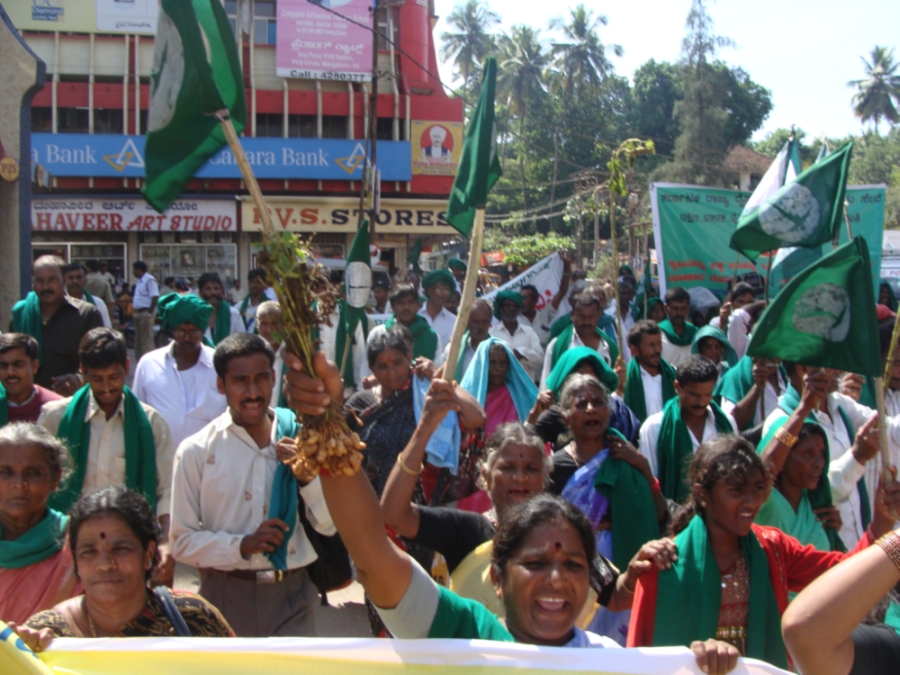Warning to the government against the corporatization of the Land and the Sea: Blockade!
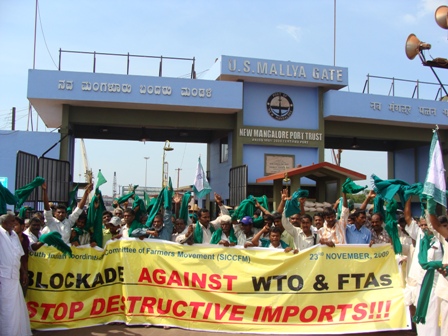
South Indian Coordination Committee of Farmers Movement | 25 November 2009
Warning to the government against the corporatization of the Land and the Sea: Blockade!
Mangalore’s Port blocked for hours, “No to destructive Imports!!”
On 23/11/2009 the South Indian Coordination Committee of Farmers Movement (SICCFM) organized a mass rally and blocked the new Mangalore port in Karnataka against the corporatization of land and sea, and the destructive cheap imports of food and crops because of WTO and FTAs. All the gates of the New Mangalore Port were completely blocked by the protesters and the functioning of the port was stopped for hours.
The protest was held by the farmers from KRRS and Green brigade from Karnataka, Kerala Coconut Farmers Association, the Tamil Nadu Farmers Association along with the fisher-folks from Kerala State Independent Fish Workers Federation and from Coastal Karnataka Fishermen Action Committee.
Hundreds of women and men marched in the streets of the city of Mangalore from Central Railway Station to Kottara Chowke and then proceeded towards the New Mangalore Port. Farmers blocked the port and sat in front of the main gate, shouting slogans, carrying and displaying banners against cheap food imports, WTO and FTAs.
Angry farmers also carried plants of ground nut, sunflower and coconuts as the prices of these products are severely affected by the cheap import of Palm oil from countries like Malaysia and Indonesia.
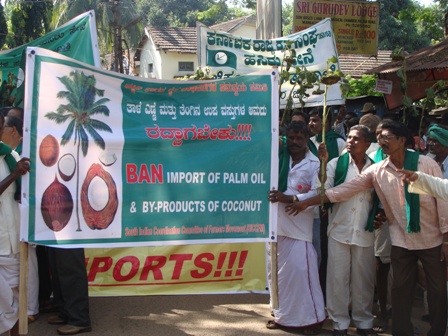
This struggle was organized in the background of the seventh ministerial meeting of the WTO’s Doha round of negotiations to be held in Geneva from 30th November to 2nd December, 2009.
The decision of the Indian Government of reopening the Doha Round of negotiation, would lead to the increase of the destructive imports into the country and would drastically affect the situation of millions of producers who are without any other dignified alternative.
Countering this position, the farmers and fisher folks demanded the central and state governments to stop any type of corporatization of land and sea, to keep agriculture out of WTO and demanded to re-establish Quantitative Restrictions on imports. This protest is also an answer to the ongoing talks between the Government of India and the USA to even expand the market access.
The effects of the destructive imports are well known to the farmers, these are some examples of what happened to their products, and to their lives:
– After signing the India-Sri Lanka FTA, prices of Kerala’s major agricultural commodities fell and the state economy sustained an annual loss of Rs. 7,000 crores. Pepper price was reduced from Rs. 21,502 to Rs. 6,644 per quintal from 1999-2000 to 2005-06. With ISFTA, the duty free import of black pepper from Sri Lanka increased from 1,385.3 tonnes to 4865.1 tonnes, from 1999-2000 to 2004-05. Domestic export price of vanilla got reduced from Rs. 6,413.45/kg to Rs. 1,679/kg, from 2001-02 to 2005-06. Removal of Quota restriction and this FTA resulted in import surge of refined coconut oil: 3753.72 tonnes to 11427.14 tonnes from 1999-2000 to 2004-05.
– Similar impacts, including import surge, fall in local prices, and fall in export prices can be expected from the India-ASEAN FTA, as well as from the implementation of the Doha Round.
The farmers declared firmly that they will not be fooled again with the products so called “excluded” from the free trade: a trick to hide the reality behind a screen. With this trick many products are officially excluded, but the byproducts of the same crops are conversely welcomed, leading to the same destructive consequences.
For example: Sugar Cane is excluded but other forms of sugar i.e. glucose, fructose, as well as molasses, and sugar confectionary will be welcomed; Coconut is excluded but coconut shell unworked will be welcomed; Cotton is excluded but cotton linter will be welcomed; Milk is excluded but yogurt, buttermilk, fresh cheese and powdered and processed cheese will be welcomed; Wheat is excluded but rye flour, bran or other forms of cereal after milling and Bulgur wheat, will be welcomed.
The protesters also pointed out, that the federal system is playing a game against them: after the Coconut Farmers of Kerala were able to win a judicial struggle and to get a Judgment in the High Court of Kerala, to ban the import of any edible oil, this Ban was practically weakened by the totally opposite policy of the Karnataka State, by allowing this imports. In this way the banned products, entering in a Port close to the border, like Mangalore - that is one of the major inlets for imported edible oil on the south-west coast, are continuing to affect the Kerala market as before (as well as the Karnataka’s and the Tamil Nadu’s).
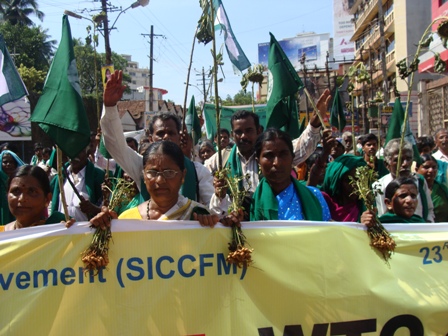
The representatives of the farmers (among them: Kodihalli Chandrashekhar, Working President of KRRS and Green Brigade, P. Ravindranath President of Kerala Coconut Farmers Association, S. Kannaiyan – Coordinator of SICCFM) delivered speeches in front of the Port.
As the police was refusing to provide water to the thirsty protestors, they warned the officials of the police to treat the farmers with respect, otherwise it would not even take fifteen minutes to break the barriers and to enter inside the port and continue the action there; so the basic right to drink was defended and the water was provided.
They declared that the action was a warning to the government of India who wants to liberalize the market much more in the upcoming ministerial meeting of WTO in Geneva. That the farmers and the fisher folks had reached the gates of the port and they will be forced to reach the ships carrying the imported goods to throw them back to the sea unless the government takes the position to protect its farmers and fisher folk.
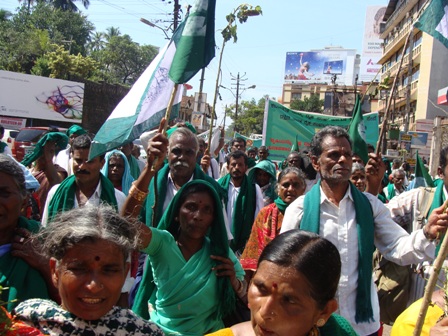
They affirmed that the land belongs to farmers, and the sea to the fishermen, any type of corporatization of land and sea will not be tolerated.
They burned finally the imported palm oil and broke the coconut to show their anger as the price has fallen to the ground.
They declared that this is the first ever blockade action against a port in India which will be intensified and will spread all over the country against all the ports, if the government will not change its position.
They also announced that their protest will continue against the same Meeting of the WTO in Geneva, as some Indian farmers representatives will participate in the protests in Europe in association with the international movements of farmers La Via Campesina and the other Movements against corporatization of Land and Sea.
For further contacts: SICCFM – siccfm@gmail.com




